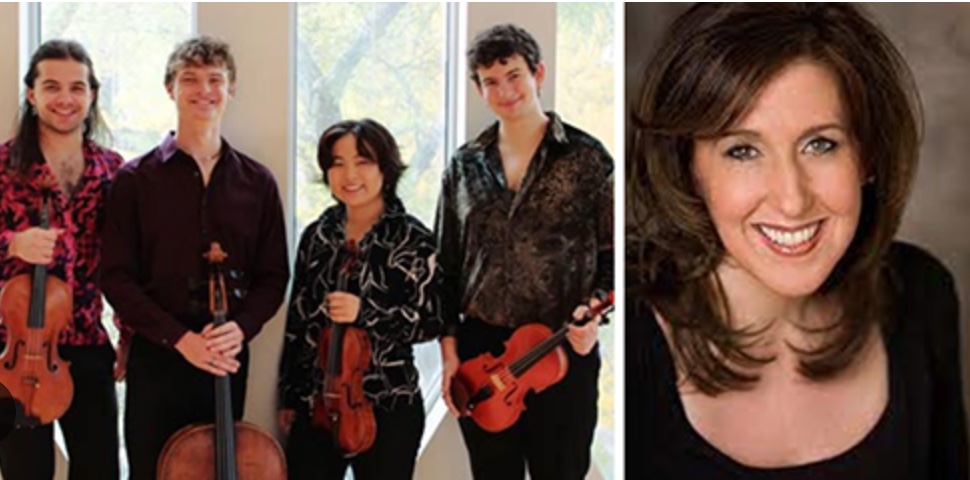by Mike Telin

And when Cleveland Orchestra trombonist and composer Richard Stout was looking for a string quartet to perform his Songs of Correspondence — which he wrote for his Baldwin Wallace faculty colleague Nancy Maultsby — on the opening concert of the Rocky River Chamber Music Society series in October, he sought out the Poiesis. Click here to read an interview with Richard Stout.
On Monday, March 25 at 7:30 pm in Gamble Auditorium, Nancy Maultsby and the Poiesis Quartet — Sarah Ma and Max Ball (violins), Jasper de Boor (viola), and Drew Dansby (cello) — will perform Stout’s song cycle based on letters of Willa Cather. The program will also include Clint Needham’s String Quartet No. 2, “Shades Of Green.” The concert is free.
I caught up with Max Ball on Zoom and began our lively conversation by asking him about the Rocky River concert.
MT: You performed the piece as part of the Rocky River Chamber Music Society series back in September.
MB: Yes. I think that concert was a success. People were really excited about the song cycle and that created a lot of impetus for the Baldwin Wallace concert to happen.
MT: As a performer, what are your impressions of the piece?
MB: It’s so much fun to play. It has such an amazing sense of peace to it that perfectly paints an atmospheric picture of these amazing texts — and all the different subjects that Rick is setting.
MT: How was it working with Nancy Maultsby?
MB: I’ve never had the opportunity to work with a singer in a chamber context before, so it’s amazing to work with an artist like Nancy. The way the quartet and vocal parts interact — individually and as a group — makes the piece so satisfying to play.
MT: You also recorded Songs Of Correspondence.
MB: Yes. It was the quartet’s second professional recording. Our first was the 15-minute Coleridge-Taylor Perkinson String Quartet No. 1. We recorded that in Chicago as a part of our Fischoff Tour. So taking on a recording project five or six times larger was something that I personally have never done before. It was also a new experience for the group.
MT: I understand that the multi-Grammy winner Elaine Martone produced it.
MB: Yes, and Elaine knows what she’s doing — working with her was such a joy. She made everything so easy and knows exactly what needs to happen at every point. You can tell the wealth of experience and passion that she has for doing this, and that is what made the experience so much fun.
MT: Clint Needham’s String Quartet No. 2 is also on the BW program.
MB: It is and I think it pairs so beautifully with the song cycle. It’s also image-based, so it paints a lot of pictures as well. It’s subtitled “Shades of Green,” and you can really feel the peaceful trees swaying, the large open valleys, and the dense forest. There’s so many intricate textures that Clint uses so creatively that are not typical of a lot of string quartet repertoire. It’s been great to push ourselves to draw out all of these textures in a way that creates the images he’s trying to produce.
MT: The quartet is now based in Cincinnati. Tell me a little bit about that situation.
MB: We all just graduated from Oberlin and are now here at CCM working with the Ariel Quartet. It’s a great situation because we get a lot of attention from them — a lot of coachings and individual lessons. It’s been an amazing environment to hunker down in and develop our voice as individuals and as a quartet.
MT: It’s an amazing story that the group won the Fishoff as undergraduates — has everybody completed their degrees?
MB: Jasper graduated in May of 2023, Sarah and I officially graduated in December of 2023, and Drew will officially get his degree in May.
MT: Was there a time after the Fischoff win when you were saying, OK, what are we going to do now?
MB: There was definitely a time when we were going back and forth and weighing options — what did we want to do and how would we go about doing it.
MT: Who did you reach out to for advice?
MB: We talked to so many people. Sibbi Bernhardsson was our primary coach for the 22/23 school year as well as Sarah’s and my private teacher — so we talked to him a lot. We also talked to members of the Verona Quartet who are in residence at Oberlin, and a bunch of other faculty members and music professionals, just to hear everyone’s thoughts about what direction to take and how to make that work successfully.
MT: I was on your website and the list of people who have and are mentoring the quartet is pretty amazing — do you know how lucky you are?
MB: It’s truly incredible — there’s such an amazing rich lineage of knowledge and sheer skill and experience in all those musicians. It’s unbelievable how lucky we are to be working with all of these people. There’s no chance that we would be where we are without the support and guidance of those amazing artists.
MT: Final question. Poiesis is derived from the ancient Greek word ποιεῖν, which means “to make,” and particularly to create something that has never been made before. How did the quartet decide on the name?
MB: We were just sitting around thinking about all the options, that’s the one that stuck with us. It just resonated with our goals as a group and how we approach our music making. So we thought it was a cool idea.
Published on ClevelandClassical.com March 21, 2024.
Click here for a printable copy of this article



